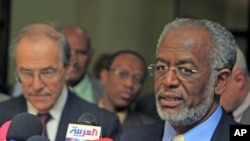U.S. Special Envoy to Sudan Princeton Lyman says he is “reasonably optimistic” that Sudanese parties can amicably resolve their remaining issues before south Sudan becomes independent on July 9. Senior officials of the north and south's ruling parties are to resume talks on the separation in Addis Ababa, Ethiopia, on Thursday.
Lyman, a veteran U.S. diplomat called back to service for the Sudan post, is not minimizing the issues still to be resolved by July 9.
But he said that given the importance to both sides of maintaining trade and energy cooperation when the south becomes independent, he is “reasonably optimistic” they will resolve the remaining problems.
“For some of these issues, it’s critical that they reach a decision by July 9th because on July 10th, they will want the oil to function, they will want people to continue to be able to trade on the borders, etcetera," said Lyman. "I don’t think these negotiations are going to be easy. But I think there’s a great deal of impetus to reaching the critical decisions that enable the two sides to go forward.”
High-level delegations from the Khartoum government and the southern Sudanese capital Juba reconvene Thursday in Addis Ababa to try to tackle remaining issues including oil-sharing, post-separation currency policy, and dividing Sudan’s external debt.
The two sides still have not resolved the status of the oil-rich central Abyei region along the north-south dividing line.
But Lyman, who visited Khartoum and Juba earlier this month, expressed relief that the parties were able to step back from a potential confrontation after a military clash in Abyei May 1.
He urged them to withdraw excess forces from the disputed region under a deal mediated by the African Union and United Nations.
Lyman was joined at a State Department briefing by U.S. Agency for International Development Administrator Rajiv Shah, who made his own trip to the region with British and Norwegian officials, focusing on how the two states can be economically viable.
Shah said would-be investors in the south are encouraged by commitments by officials there to economic transparency and private enterprise. He said the north, facing a loss of oil income, will have to diversify its economy.
“They need to reinvest in agriculture, which continues to be the area of employment for 80 percent of the population. And they need to do that in ways that recognize that trade with the south, whether in the agriculture sector or other sectors, is going to be a critical part of an economic strategy, just as for the south, trade with the north will continue to be quite important for their economic viability,” said Shah.
Special envoy Lyman, who also visited Sudan’s troubled western Darfur region, said U.S. officials are “very disturbed” by recent fighting between government forces and Darfur rebels, including government airstrikes.
He expressed frustration with the stance of both sides at Darfur peace talks in Doha.
In response to questions, Lyman said progress on a U.S.-proposed “road map” to full normalization of U.S. relations with Khartoum is not frozen because of the Darfur violence. But he said events there are, in his words, “terribly relevant” to road map implementation.
US Envoy Optimistic of Peaceful Sudan Separation




